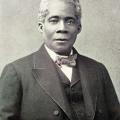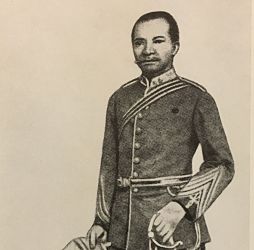55. Planting the Seeds: James Africanus Beale Horton
Africanus Horton looks toward a future of self-government for West Africa beyond slavery and colonialism.
Themes:
• J.A.B. Horton, Physical and Medical Climate and Meteorology of the West Coast of Africa (London: 1867).
• J.A.B. Horton, West African Countries and Peoples, British and Native (London: 1868).
---
• A. Adeloye, Doctor James Africanus Beale Horton: West African Medical Scientist of the 19th Century (Pittsburgh: 1992).
• E.A. Ayandele, "James Africanus Beale Horton, 1835-1883: Prophet of Modernization in Africa," African Historical Studies 4 (1971): 691-707.
• C. Fyfe, Africanus Horton, 1835-1883, West African Scientist and Patriot (New York: 1972).
• J. Howell, Exploring Victorian Travel Literature (Edinburgh: 2014), ch.3.
• R. July, The Origins of Modern African Thought: Its Development in West Africa During the Nineteenth and Twentieth Centuries (New York: 1967), ch. 6.
• A.O. Nwauwa, “Far Ahead of his Time: James Africanus Horton’s Initiatives for a West African University and His Frustrations, 1862-1871,” Cahiers d'Études Africaines 39 (1999), 107-21.
• O. Taiwo, How Colonialism Preempted Modernity in Africa (Bloomington: 2010), ch. 3.
• N. wa Thiong’o, “Europhonism, Universities, and the Magic Fountain: The Future of African Literature and Scholarship,” Research in African Literatures 31 (2000), 1-11.







Comments
Contradiction?
At one point you mentioned how Horton thought that domestic slavery was antithetical to civilisation, but later you mention how he thought Rome brought civilisation to Europe. I'll admit, I don't know much about Roman slavery, but unless Horton is talking about a specific kind of slavery which maybe the Romans didn't practice that would somehow make the difference between a polis that brings civilisation and one that is antithetical to it, wouldn't this be a contradiction?
In reply to Contradiction? by Andrew
Roman slavery
That is a good point! I had a look back at the script and see that the context is a contrast with pre-Roman Britain, so perhaps he was just not thinking about the fact that Romans practiced slavery too (people often don't). To be honest though I don't remember whether he ever brings that up, I kind of think not, but this is a podcast we produced some time ago so my memory may be failing me!
In reply to Roman slavery by Peter Adamson
It was quite jarring…
It was quite jarring honestly when I noticed that haha. I do think this causes severe problems for a lot of views though. Since unless he has a subtle way to get around this contradiction, the two ways I can think of basically involve abandoning one of the two points that cause the contradiction, which leads to catastrophe for his worldview (well, I say that, but to be honest that might be hyperbole. Maybe challenged is better. If it wasn't so late that I am writing this I would check to see if there are more catastrophic implications than just challenging ones and questions but I've already spent long enough time on this one comment and want to be done with it. Accidentally lost this comment once half way through it to make it worse).
1. Abandon the view that domestic slavery is antithetical to civilisation. Then, why doesn't Africa have civilisation then in his worldview? It made sense before, since if a place has something antithetical to civilisation, then it wouldn't have civilisation then. But now? He needs to give reasons why Africa is uncivilised, other than just empty prejudice against local traditional practices and saying this shows just how low they are on the level of civilisation (your point about the division of labour wouldn't help here, since a lot of work also falls onto women in industrial Britain). Either prove it positively like that, or negatively, via explaining what exactly civilisation is, and pointing to how Africa doesn't have that feature. If he can't do either, then I see no reason why we should say Africa was uncivilised, undercutting justification for British colonialism. And anyway, as a side point, I don't think his worldview really has the resources/tools to maintain his opposition to domestic slavery if he abandons that view about it being antithetical to civilisation.
2. Abandon the view that Rome had civilisation and brought it to Britain. Then when did Britain become civilised? I don't think I need to spell out how any justification for colonialism is completely shattered if the colonising nation isn't civilised themselves in his worldview, so he needs to answer this. Who civilised them? The Anglo-Saxons? The Normans? Either way he is going to have to choose due to his idea that "a nation can't develop civilisation on their own, it has to be brought to them from abroad"[1] (paraphrasing). If he doesn't, then he would have to abandon the previous idea that a nation can't civilise itself. This would land him in huge hot water though, because this would again undercut his justification for British colonialism. He would have to argue that somehow, foreign despotic rule is somehow more justifiable than allowing them to develop on their own terms, or giving them help while they develop themselves (basically something more equal, Britain trying to encourage civilisation through a mutual relationship and sharing of resources and knowledge but still on independent and equal footing, rather than conquest and tyranny).
As a side note, he must have been ignorant of Britain's role in the Transatlantic slave trade, especially with the use of its colonies to gain slaves and trade them.
[1] Then how did nations become civilised in the first place? How did Rome become civilised in his view? This really throws you for a loop when you stop and think about it.
Add new comment